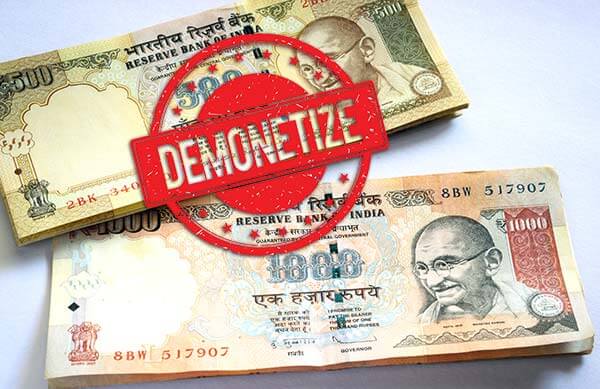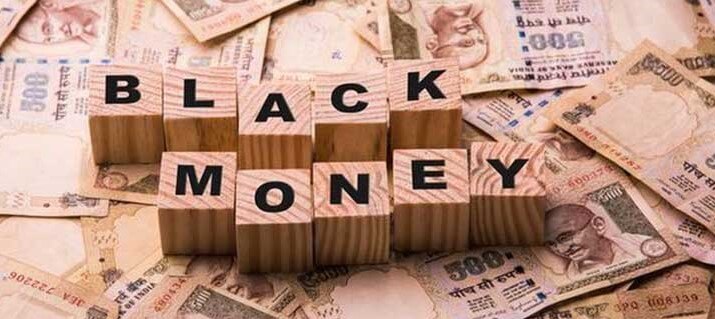Advantages and Disadvantages of DemonetizationDemonetization is the process in which the legal currency of a nation is declared invalid for physical monetary transactions by the government. In this, the particular denomination of notes or coins ceases to exist as legal tender. The objective of demonetizing a nation's currency can be different in each case. Still, the most likely objectives behind this are to curb corruption or remove currency of higher denomination that is unnecessary, to counter counterfeit currency, etc. 
Therefore, under demonetization, the legal tender of the existing currency is canceled and pulled out from circulation in the country, and the new currency is issued. The reason for such a decision varies depending on the country, but the core aim behind this is to safeguard national interest. Demonetization in IndiaIn India, recently, the NDA government, in its first term of 2014, declared demonetization on 8th November 2016. In this demonetization, the banknotes of INR 500 and INR 1000 were stripped of legal tender status, and their circulation was prohibited. The government also issued new notes of INR 500 and INR 2000. The issue of the denomination of INR 2000 banknotes was new for the country because, for many years, the INR 1000 was the highest denomination note available. It was not the first time in 2016 that demonetization was done in India. In 1946, the RBI demonetized the currency notes of INR 1000 and INR 10,000 that were under circulation. After that, in 1954, the currency notes of INR 1,000, INR 5,000, and INR 10,000 were reissued. Then in 1978, the Morarji Desai government demonetized the banknote of INR 10,000; until 2016 INR 1,000 was the note of the highest denomination. Everywhere around the world, the reaction of the common public and highly noted economists towards demonetization was a bundle of good and bad. Some believe demonetization is the masterstroke in the fight against corruption, while some believe it is a tool for corruption to make black money into white. Ultimately like all other decisions of the governments, it also has some advantages and disadvantages that are discussed below. Advantages of Demonetization1) Increases Deposits with the Banks Demonetization impacts the tendency of people to store physical notes in their homes. It is due to the cancellation of the legal tender of the banknotes, as it makes it very difficult for people to exchange their money with the newly issued currency in banks. This increases the liquidity with the banks as they receive more funds now, as people abstain from keeping cash in their homes. 2) Improves Currency Circulation Due to demonetization, people deposit their physical cash in the banks for exchange with valid currency; this helps extract all the struck cash piled in the homes that were out of circulation. For a healthy economy, the continuous flow of currency is very important; if the currency is in circulation, there will be less stress on the government to print new notes and incur extra expenses. 3) Helps in Contouring Counterfeit Currency One of the biggest advantages of demonetization is that it completely thrashes the counterfeit currency lobby. The cancellation of legal tender destroys the usage of printed counterfeit currency notes. It is a major blow to the counterfeit currency industry, and governments often make such decisions in case the problem of counterfeit notes spreads widely in the country. 4) Helpful in Tracing Black Money Countering the problem of black money is the most used reason for demonetization. In demonetization, the old currency ceases to exist, so the black money held by the corrupt people in physical form becomes useless as they are unable to exchange that money in the bank. 
If they will go and exchange that money from the bank, those corrupt people will come under the radar of tax and vigilance departments. It makes it easier for the authorities to track corrupt people because they cannot provide true information regarding their income. Therefore, it is a win-win situation for the government from both sides as they get the chance to track the corrupt person when he comes to exchange the money, and even if that person does not come to exchange the money in the bank, the money has no value and remain as a piece of paper. 5) Downside Movement of Lending Rates As a result of demonetization, the circulation of money improves, and the banks' deposit base grows positively; this helps reduce lending rates. Banks are better positioned to lend more to businesses due to increased liquidity at low rates. This leads to the growth of more infrastructural activities and provides growth opportunities. 6) Helps in Countering Illegal Activities Demonetization halts the circulation of current currency; this affects various illegal activities operationalized in the country, like hawala, terror financing, etc. The stripping of the legal tender status of the currency nullifies the existing currency used for financing such criminal activities and puts the brake on their operation. It is a very important weapon in the fight against such illegal activities. Disadvantages of Demonetization1) Causes Panic Among the Public Canceling the legal tender of currently available money is disturbing news for the common public. It creates havoc among the public regarding their earned money, leading to panic among them. After that, people have to put some extra effort into exchanging invalid currency notes, which is an excruciating phase for the public. This is the inconvenience that people face during demonetization. 
2) Halt in the Economic Development Demonetization disrupts the monetary circulation of the country, and for some periods, the physical monetary transaction becomes very difficult due to the cancellation of existing currency. The transaction problem hindrances the business and economic activities of the country for some moment, resulting in a short period of standstill in the country's economic growth. 3) Recalibration of ATMs In demonetization, the government cancels the existing currency and issues a new currency; this process poses the problem of the recalibration of ATMs. Recalibration of ATMs means modifying the ATMs as per the requirements of the newly issued notes and removing the system of pre-existed notes so that it can dispense the new notes without any error. Recalibrating all the ATMs in the country is a big challenge for the authorities. 4) Causes Liquidity Crunch The invalidation of existing currency and improper supply of newly issued currency creates the situation of liquidity crisis in the market. The non-availability of ample liquidity in the market obstructs economic activities and the common public's living. In a country where the digital transaction is not widely accepted, this becomes the biggest problem because people can only purchase their bread if they have the money in their bank accounts. Therefore, a liquidity crisis is a major concern for the public and the government that comes with demonetization. 5) Short-term Downfall in the GDP The country that decides to demonize has to bear the curse of downside movement of GDP in the short run. It is due to the disturbance in the financial position of the businesses and economic activities. It causes disruption in the financial sector that destabilizes the growth vehicle. But after some time, the economy tends to get back on track when the liquidity recovers in the market. Therefore, even a financially strong country has to face falling GDP for a short time. 6) Payment Crisis Canceling the legal tender of a country's currency creates a payment crisis. A country whose payment system is not digital faces the problem of a payment crisis. The laborers cannot get their payments, the traders do not receive their payments, and the country's retail business faces difficulties in operation, all due to the non-availability of legal tender cash among the public. So, all the monetary transactions get disturbed, from the payment of bills to the retail trade. Bottom LineDemonetization is important for fighting various evils like corruption, counterfeit currency racket, tax evasion, etc. It helps in tracing and restricting illegal economic activities. As we know, everything comes with a cost, demonetization also has some major concerns like an inconvenience to the public for a while, a standstill in the growth of the economy, a liquidity crisis, etc. Therefore, it is a bold decision to make for the betterment of the country, but authorities should take this step with proper planning and great precision. |
 For Videos Join Our Youtube Channel: Join Now
For Videos Join Our Youtube Channel: Join Now
Feedback
- Send your Feedback to [email protected]
Help Others, Please Share










